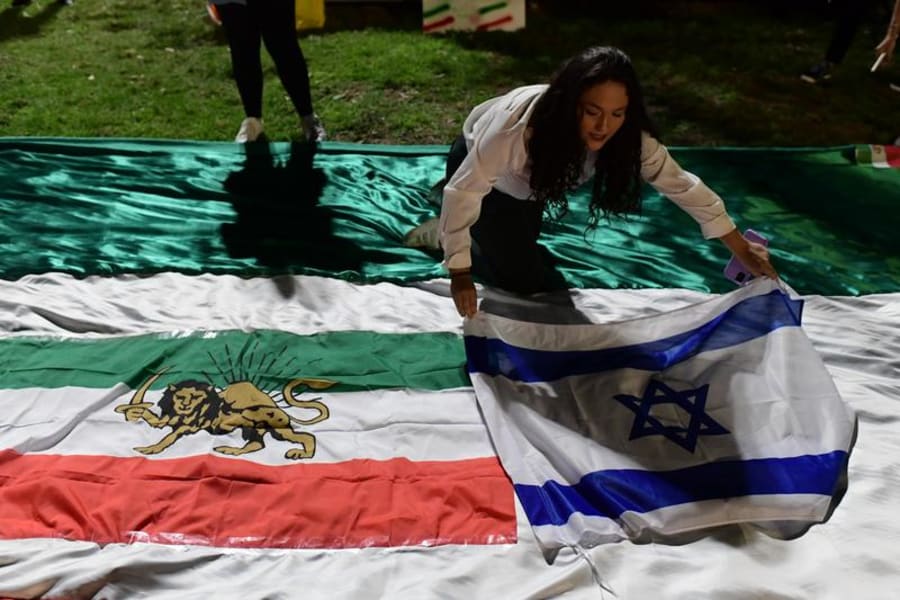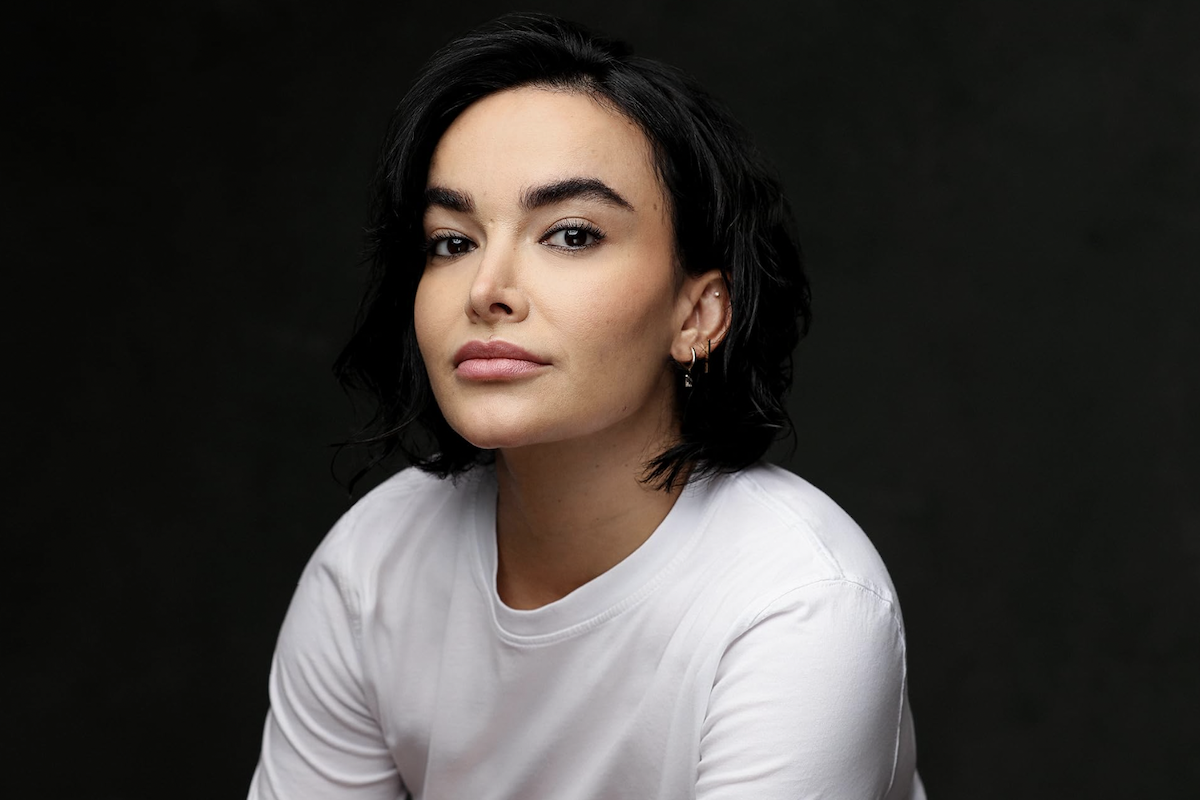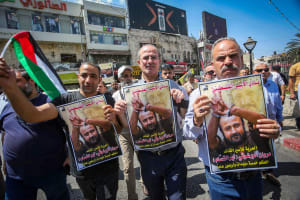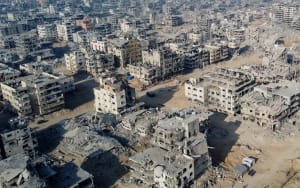'We are being hunted': Iranian exile speaks at Israeli screening of award-winning film

After her third arrest by the morality police for deviations from the strict dress code, Iranian singer, Golazin Ardestani, fled to Europe to pursue her singing career in peace. Now she has added acting to her repertoire, seeing both film and music as powerful tools to fight the oppressive regime in her homeland.
Ardestani, who prefers to be known simply as “Gola,” shared some of her thoughts about Iran and the struggle for freedom while she was in Israel for a screening of the new movie “Mortician” at the 42nd Haifa Film Festival.
The exiled singer plays the part of Jana in the movie in which an Iranian dissident discusses with a mortician the decision to end her life in protest against the regime.
“Jana is the echo of my voice. Her story is my story too; the fear, the hope, the rage, the anger. It’s all real. These are all feelings I carry, but I didn’t play myself,” Gola told YNet in an interview.
“There’s a thin line between me and Jana. She wanted to end her life because she had nothing left to lose, but that’s not a mindset I believe in.”
While Gola may stand against suicide, she shares the frustration of her character, Jana, appreciating why some make that terrible decision.
“When I had to understand what drives people to that point, I studied a few who had made that choice. In fact, while we were filming this movie last November, news broke of the suicide of Kianoosh Sanjari, an Iranian journalist who jumped off a building in Tehran," she explained.
“He ended his life, and the last sentence he tweeted was: ‘We die for the love of life, not for death’. He believed maybe it would change something. That was one of those moments when you realize that Jana is a tribute to so many lives, to all the silenced creators who are outside Iran while the Iranian regime threatens their families back home, interrogates them, detains them," she said.
Gola went on to explain that it was hard for her but she believes it is what makes Jana so compelling. "She thinks she’s going to take her own life, but she still believes she’ll remain afterward. She believes her work will create a change even after she’s dead. She believes in the power of music. She believes in the power of message and communication, and as an artist, that deeply resonated within me too," she explained.

Gola, like the character Jana, believes music and art can bring change. She related some of her experiences growing up in Iran under the Iranian regime, and her yearning for freedom.
“As a girl, I wanted to ride a bike, I wanted to go watch soccer with all the boys. But I was always told, ‘You can’t do that, you’re a girl',” she said. “At seven years old, I already had to wear a hijab. It was very restrictive for me. It was hot, uncomfortable. I never understood it."
By the age of 16, her radical streak began to show as she took drastic action in order to live in freedom. She shaved her head in order to live as a boy in freedom. However, it wasn’t long before it became impossible to hide her feminine frame. “I think that’s when I began to protest in another way, through art, through music,” she recalled.
"When I studied the psychology of music in London, I realized in hindsight what music really does to people, to their brains, their behavior. That’s when I felt I could use my music as a tool, as something that can influence society."
Not only has Gola experienced harsh restrictions and censorship in Iran while trying to pursue her singing career, but even after she fled, some Iranian organizations attempted to censor her during a concert in Canada. The phenomenon of Iranian exiles being hounded and threatened by the regime, even while thousands of miles away, features strongly in the film.
Directed by Abdolreza Kahani, “Mortician” is set in Canada and focuses on the lives of exiled Iranians. Jana (played by Gola) shares her plan to end her life in protest, asking fellow Iranian mortician (played by Nima Sadr), to take care of her corpse when she’s gone.
It was Sadr who told Kahani about Gola, which led to her story being woven into the movie which was filmed on a smartphone from start to finish. It is all the more remarkable, then, that the movie earned the Sean Connery Prize for Filmmaking Excellence at its world premiere at the Edinburgh Festival.
“I immediately knew this was a powerful way to speak out loud,” Gola says. “To show them they can’t silence us. I get threats like, ‘Don’t sing those political songs.’ So guess what? This time it’s not just songs, it’s a film. Not only are we not staying quiet, we’re doubling our power.”
“The film was intended to raise awareness, because these kinds of stories happen every day worldwide,” explains Gola. “The Iranian regime is everywhere. They’re among us. It could be your best friend and you wouldn’t know it. We’ll never know who they are, no matter where we live, and as long as these people control Iran, we can’t feel safe anywhere in the world."
Gola is not exaggerating. Other Iranian activists such as Masih Alinejad have been targeted even living in the West, facing multiple attempts at kidnap and even assassination at the hands of the Iranian regime.
“Exile is hard, but it’s also very beautiful because there’s a kind of rage in it,” Gola reflected.
She continued, “There’s anger inside me that fuels the fire, and I can use that energy to create something bigger than myself. And yes, exile has made my pen much sharper. If I weren’t in exile, maybe I wouldn’t be so blunt. In one of my songs I say, ‘Fear me. I have nothing left to lose. I’m exposed, raw, and fearless.’”
Speaking about the “Women, Life, Freedom” movement sparked by the murder of 22 year-old Mahsa Amini for showing a lock of hair, Gola insists that it’s far from over.
“It wasn’t an uprising, it’s a revolution, and it’s ongoing,” she says. “I truly believe the future of Iran is in the hands of women. Women in Iran are incredibly educated, and now they’re aware of their rights. They can see how the rest of the world lives. They are fearless."
"And I also want to say that men are playing an incredible supporting role, because I truly believe in collective power. You can’t move forward without the other group. If women are holding the torch, men are standing behind them, saying, ‘I’m with you. I’m your father, your brother, your son. Go for it'," she continued.
Gola expressed great hope that the regime will fall in the future, saying, “I don’t believe change will be gradual. The Iranian regime is deeply committed to its ideology. There won’t come a day when they say, ‘Okay, starting tomorrow you can be a little freer with your hijab, you can choose what to wear.’ They want to hold on to power for as long as they can.
"I believe change will come when people realize their own strength, when the wall of fear continues to fall. The change will be sudden. It will happen overnight."
The singer is also enthusiastic about partnering with Israelis, saying she has many Israeli friends. After a collaboration with Israeli artist, Idan Raichel, she said she “realized how much our people have in common.”
"That’s probably why the Iranian regime doesn’t want us to connect, because when we do, we’re naturally drawn to each other. These are two people who are only separated by their regimes. Our hearts say something else," she added.
Gola was in Israel over Sukkot while the hostages were being freed, and has strong feelings about Israel’s conflict with Iran and its proxies.
“During the war, people told me: ‘Are you happy now that Israel is attacking your country?’ And I said: ‘Wait. Israel is not attacking my country. Israel is attacking the murderers who are killing my country, killing my people.’ That’s different. My country is finally being freed.”
"When you’re in a life-or-death situation, like Iran is now, it doesn’t matter who helps you. People are being tortured, people are being killed, by the hundreds and thousands. So it really doesn’t matter who brings about the change.”
She clarified: “The people of Iran are not their government. They’re not the regime. They’re not terrorists. A terrorist organization has taken over our country. Absolutely. We are being hunted. We are captives. And our country has been stolen.”
“The threats are real, the fear is real, but I don’t let that fear stop me,” she insisted. “My biggest fear is living a life of emptiness, not doing something meaningful in this world.”

Jo Elizabeth has a great interest in politics and cultural developments, studying Social Policy for her first degree and gaining a Masters in Jewish Philosophy from Haifa University, but she loves to write about the Bible and its primary subject, the God of Israel. As a writer, Jo spends her time between the UK and Jerusalem, Israel.
You might also like to read this:

















